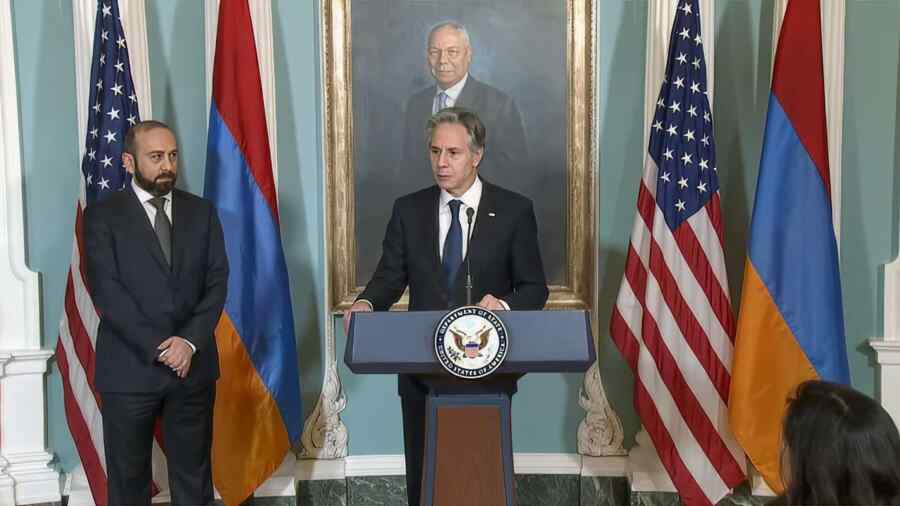Nulla dies sine linea. No sooner had the controversy over the Armenian government’s project on the country’s accession to the European Union subsided than new news came from Washington. Armenian Foreign Minister Ararat Mirzoyan and American Secretary of State Anthony Blinken signed the Charter of Strategic Partnership in the US capital of Armenia
The spectrum of assessments of this event is wide. On the one hand, the signing of the document is presented as a clear signal (and symbol) of Yerevan’s estrangement from Moscow, and on the other hand, doubts are expressed about the effectiveness of the Charter. After all, on the American side it was signed by a representative of the administration, which in less than a week will hand over its post to a new guard. Who are already tired of waiting. And is ready to realise its ideas about a beautiful new world order led by America, which will restore its former greatness!
I think the truth lies in the middle. If you go carefully through the text of the Charter (it is not too difficult, the volume of the document is small), it is easy to find its declarativeness. The document envisages ‘expanding cooperation in such areas as economy, security, defence, democracy, inclusiveness and people-to-people contacts’. Most of the points are already being implemented, many of them ideologically coloured. As if ‘inclusiveness’ or ‘people-to-people contacts’, taking into account the diaspora factor, will be directly inaugurated from 14 January 2025! At the same time, the strengthening of defence and security cooperation ties is a formula worth paying attention to. Even in spite of its obvious declarativeness and the absence of any clear guarantees for Armenia on the part of the United States. A certain ‘sleeping norm’. It can be filled with specifics, or it can be left in a state of half-sleep.
Armenian political elites, ‘former’ and current, are rigidly opposed to each other. Recalling the film character of the great Frunzik Mkrtchyan, ‘they have such personal dislike that they can’t eat’. But one thing they have in common is their adherence to the bandwagoning principle in foreign policy. Lean on the strong! Yesterday it was Russia, today it is the United States. Let me say right away that there is nothing shameful in such behaviour for a small country. But it is important to understand some nuances. Neither Moscow before, nor Washington (as well as Brussels) today and tomorrow will make a complete and final choice between Armenia and Azerbaijan. The Charter-2025 will not push the US away from Turkey either. On the contrary, the U.S. will carefully nurture and cherish Azerbaijani-Israeli cooperation and support Ankara especially at the time of its disagreements with Moscow, because it is cheaper to push Russia out of Eurasia. Consequently, the expected breakthrough for Yerevan will not happen with the expected American assistance. After all, ‘democracy’ and ‘inclusiveness’ can be maintained by making concessions to neighbours for the sake of ‘peace in the region’. Naturally, under American moderation and at the expense of reducing Russian influence in Eurasia!
And the last (in order, but not in importance) thesis. Today in Armenia, both politicians and public figures like to repeat one idea: Russia is not an effective guarantor, Moscow failed, did not help. Even if we accept such arguments, a natural question arises. On 9 January it was 16 years since the US concluded a strategic charter with Georgia. There, too, were theses about ‘democracy’ and ‘inclusiveness’. Did it help Tbilisi to regain Abkhazia and South Ossetia? It is a rhetorical question. At the same time, in 2009 the states were not faced with the need to balance between Georgia and Abkhazia. There sympathies were entirely on the side of the ‘beacon of democracy’, which was then, as we know, based in Tbilisi. But both the West and Russia both before and now have to manoeuvre between the interests of the Turkic tandem and Armenia, weighing on the scales all emerging collisions. In 2024, the Americans themselves ‘froze’ the agreement with Georgia. Motive? Revision of Tbilisi’s foreign policy course. But was it not because the strategic charter on the part of the US, firstly, was mainly instrumental in nature, and, secondly, contained more declarations than practically useful things?

